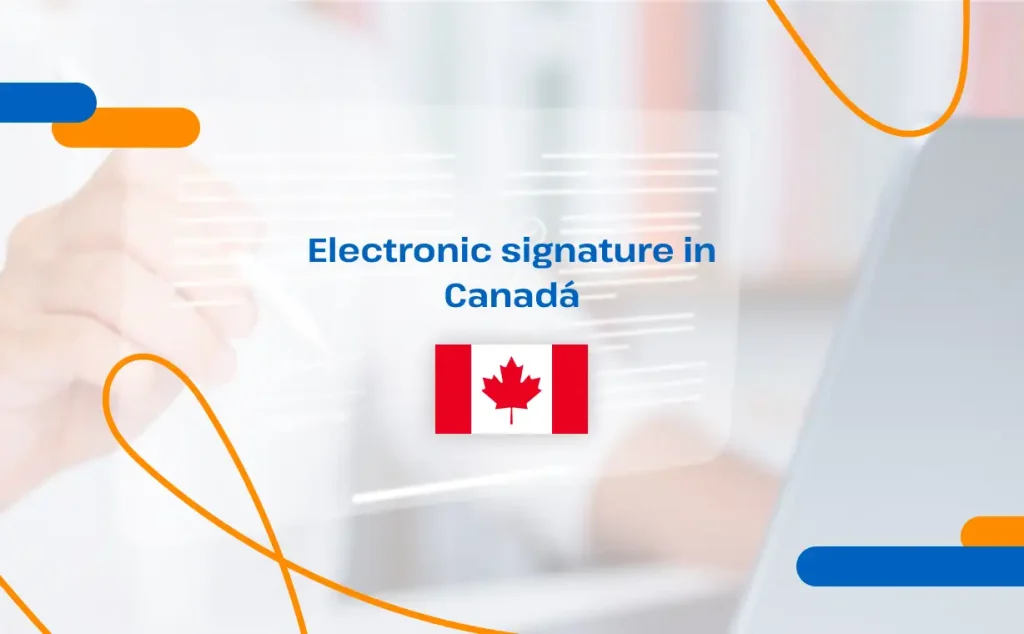
Updated December 2024
The electronic signature in Canada must guarantee the authenticity, confidentiality and integrity of the signed message or document. For this purpose, different authentication methods or factors or identity data are used. The main types are:
- Digital signature: it is a numeric value that is added to a message or document and guarantees its integrity and authenticity by means of asymmetric cryptography and a digital certificate.
- Electronic signature: Any method that allows the identification of a person in relation to a message or document.
- Certified electronic signature: Any signature method using identity factors or data, which includes a digital certificate to guarantee its security and integrity.
Regulations and Legislation of electronic signatures at the federal level
At the provincial level, electronic signatures in Canada are recognized by the Personal Information Protection and Electronic Documents Act (PIPEDA) of 2004, which states that an electronic signature is a signature consisting of one or more letters, characters, numbers or other symbols in digital form incorporated in, attached to or associated with an electronic document.
According to this law, this type of signature is equivalent to a handwritten signature and is fully admissible in court. Therefore, it is legally possible to operate with physical or digital documents.
Requirements
To use an electronic signature in Canada securely, companies and users must ensure that they meet a number of requirements. These are requirements defined by PIPEDA, explicit.
The signature must have or fall under the following characteristics:
- The signature must be unique and distinctive
- Created under the sole control of the signer
- The signer’s identity can be confirmed
- It is protected by technology that can detect any later change in the document. In Viafirma, it is possible to know it thanks to what is known as biometric or digitalized signature.
Electronic signature regulations in Canada at provincial level
Electronic signatures in Canada are legal and valid before the law since 1999, as part of the Uniform Electronic Commerce Act (UECA). Nine provinces accept and recognize it: Alberta, British Columbia, Ontario, Quebec (except Montreal), New Brunswick, Nova Scotia, Newfoundland and Labrador, and Yukon.
Quebec is the only province that has its own electronic signature laws, set out in the Act to Establish a Legal Framework for Information Technology.
As these laws are drafted by and for the provinces, some aspects may vary from the federal or UECA laws.
Supplementary regulations on electronic signatures in Canada
In addition to federal and provincial laws, there are other complementary regulations governing specific aspects of electronic signatures in Canada.
For example:
- The federal Electronic Commerce Code (ECC) sets out the general principles for legalized electronic commerce in Canada.
- The Federal Code for Consumer Protection (CFC) establishes the rights and obligations of consumers and suppliers in connection with electronic transactions.
- The Federal Code for the Protection of Intangible Cultural Heritage (CFCPI) establishes the criteria for protecting intangible cultural heritage through electronic use.
Use cases
In Canada, electronic signatures are used in a wide range of sectors. The following are some of the main sectors where its use is common and increasingly important:
- Financial sector. Electronic signatures in the financial and banking sector find numerous forms of applications. To name a few examples, it is used in opening bank accounts, signing loan and credit approvals, and financial and insurance contracts.
- Real estate sector. Property purchase and sale contracts, lease contracts or earnest money agreements.
- Corporate sector. Besides, it is also used in corporate transactions related to human resources departments (contract signature) or commercial departments (purchase orders, relations with suppliers or consumer agreements), among others.
Viafirma, your electronic signature solution in Canada
If you are looking for an electronic signature solution in Canada, Viafirma has the solution that adapts to your needs.
Interested in knowing more? Contact us and we will inform you about our products and electronic signature solutions.